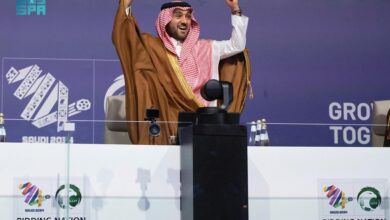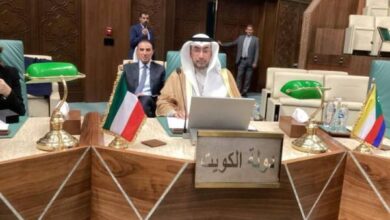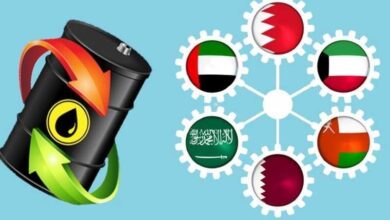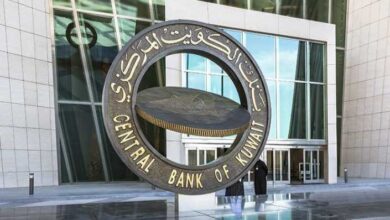
-
Non-hydrocarbon primary balances improved in Bahrain, Oman, and Qatar but sharply declined in Kuwait, Saudi Arabia, and the UAE. Kuwait experienced the largest decline.
-
The growth of oil-exporting countries in the Middle East and North Africa would reach 2.9 percent in 2024, according to International Monetary Fund
-
Non-hydrocarbon primary balances improved as a percentage of non-hydrocarbon GDP in Bahrain, Oman, and Qatar, but they sharply declined in Kuwait, Saudi Arabia, and the UAE.
-
Voluntary reductions in oil production will hinder growth in some economies, although non-hydrocarbon growth remains resilient. Higher oil production is expected to boost growth in countries outside the GCC.
During the spring meetings of the International Monetary Fund (IMF) and the World Bank in Washington, the IMF released its latest report on the region. It projected that the growth of oil-exporting countries in the Middle East and North Africa would reach 2.9 percent in 2024. This figure is slightly lower than its previous forecast in January of 3.1 percent but higher than the growth rate of 1.9 percent in 2023.
The IMF noted that voluntary reductions in oil production will hinder growth in some economies, although non-hydrocarbon growth remains resilient. Conversely, higher oil production is expected to boost growth in countries outside the GCC.
Expectations also suggest that public financial surpluses will decrease in Gulf countries reliant on public resources for economic diversification, such as Kuwait, Qatar, and the UAE, due to the decline in hydrocarbon prices.
However, it is expected that certain hydrocarbon-exporting countries will continue to manage their public resources, reduce their dependence on the hydrocarbon sector, and support diversification efforts. This trend is evident in Bahrain, Oman, Qatar, and Saudi Arabia.
Oil cuts, borrowing challenges, and economic balances
The report indicated that emerging market and middle-income countries faced challenges with high borrowing costs in terms of fiscal policy, while oil production cuts resulted in weakened revenues for many oil-exporting countries in 2023.
Public financial outcomes varied across Gulf countries. Non-hydrocarbon primary balances improved as a percentage of non-hydrocarbon GDP in Bahrain, Oman, and Qatar, but they sharply declined in Kuwait, Saudi Arabia, and the UAE.
In this regard, Kuwait experienced the largest decline. However, overall fiscal balances deteriorated in 2023 in most GCC economies due to lower oil revenues following production cuts and relatively stable oil prices.
Although overall balances have also declined among non-GCC oil-exporting countries due to lower oil revenues, non-hydrocarbon primary balances are estimated to have improved overall.
Voluntary production cuts
The IMF noted in its report that uncertainty has become increasingly prevalent due to ongoing conflicts, disrupted shipping traffic, and declining oil production. Consequently, an uneven recovery has begun to emerge, with varying growth rates across the Middle East and Central Asia region this year.
Conflicts continue to ravage many economies in the Middle East and North Africa region, highlighting the significant human losses and profound long-term economic impacts they are causing.
Some emerging market and middle-income countries are grappling with financial pressures and persistently high inflation rates. Despite this, some oil-exporting countries have chosen to implement additional voluntary production cuts while also actively promoting non-hydrocarbon activities.
Declining inflation
The report also indicated that Gulf countries experienced a significant slowdown in hydrocarbon sector growth due to several rounds of voluntary production cuts by OPEC Plus countries. As a result, real GDP growth in these countries sharply slowed to 0.4 percent, despite strong growth in the non-hydrocarbon sector driven by ongoing reforms aimed at economic diversification, high domestic demand, and total capital inflows.
Following global trends, inflation in many economies in the Middle East and North Africa region began to decline in 2023, reflecting the impact of tightening monetary policy and earlier declines in commodity prices.
Consequently, successive monthly headline and core inflation in most oil-exporting, emerging market, and middle-income countries have started to decline to levels close to historical averages.
With inflation on the decline, monetary policy tightening has largely halted. Egypt stands out as the only country to raise its base interest rate by 800 basis points in October 2023. According to IMF data, Kuwait has the lowest interest rate among Gulf countries.











